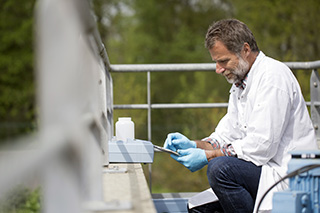Partnerships for Environmental Public Health (PEPH)
December 3, 2021 • 2:00 - 3:30 p.m. ET

During the COVID-19 pandemic, multiple states, municipalities, communities, and NIEHS-supported researchers have been tracking and mitigating infections using wastewater-based epidemiology. These researchers are using this methodology to trace and reduce COVID-19 exposures in cities, tribal nations, on university campuses, in nursing homes, and rural communities.
As COVID-19 vaccination rates increase and COVID-19 testing slows, wastewater analysis and tracking could play a role in modelling the potential spread of COVID-19. Additionally, this research is being used as a supplemental metric to help understand the spread of COVID-19 and could lead to early warning systems to inform public communications, individual behaviors, population testing, and public health policy decisions to reduce risks from COVID-19 and possibly other diseases.
This webinar brought together NIEHS-supported researchers working with university campuses, tribal nations, and Appalachian communities, to discuss their unique research perspectives and experiences. We also heard from the Occupational and Environmental Epidemiology Branch Head of the North Carolina Department of Health and Human Services, who described the North Carolina Wastewater Monitoring program.
Presentations
- Wastewater Monitoring for SARS-CoV-2 in Colleges and Communities: Use-driven Collaboration (2MB) - Katrina Smith Korfmacher, Ph.D.
- North Carolina Wastewater Monitoring (1MB) - Virginia Guidry, Ph.D., M.P.H.
- Wastewater-based Epidemiology: From Fringe Science to Multi-$Billion Public Health Decision-Making Tool (3MB) - Rolf Halden, Ph.D., P.E.
- Wastewater Assessment for Coronavirus in Kentucky: Implementing Enhanced Surveillance Technology (6MB) - James W Keck, M.D., M.P.H. and Sahar Alameh, Ph.D.
Experts

Katrina Smith Korfmacher, Ph.D., is a professor of environmental medicine and the director of community engagement for the Environmental Health Sciences Center at the University of Rochester. She is a policy scientist who holds a M.S. in water quality management and Ph.D. in environmental studies from Duke University. Korfmacher has worked with and studied community partnerships related to childhood lead poisoning prevention, healthy homes, air quality, land use, and other environmental justice issues for 20 years. She is the author of "Bridging Silos: Collaborating for Environmental Health and Justice in Urban Communities", which explores how to promote local problem solving through community partnerships. Since June 2020, she has coordinated the Monroe County Wastewater Coronavirus Surveillance Working Group and studied application of this technology in colleges and universities nationwide.

Virginia Guidry, Ph.D., M.P.H., has been the branch head for Occupational and Environmental Epidemiology in the North Carolina Department of Health and Human Services since January 2019. She has a Ph.D. in epidemiology and a M.P.H in maternal and child health, both from the University of North Carolina at Chapel Hill, and a B.S. in Medical Technology from the University of Delaware. She has worked on environmental health and environmental justice issues in North Carolina since 2003, including experience in community-based research, communications, and applied epidemiology.

Rolf Halden, Ph.D., P.E., is a professor at Arizona State University (ASU) and founding director of the Biodesign Center for Environmental Health Engineering, the nonprofit OneWaterOneHealth, and the ASU startup company, AquaVitas LLC. Halden has authored over 230 research papers, patents, monographs, and the 2020 popular science book, "Environment". Halden is an expert in wastewater-based epidemiology for tracking harmful chemicals and infectious disease agents like SARS-CoV-2, the causative agent of the COVID-19 pandemic. Halden serves as an American Chemical Society (ACS) Expert and has been invited repeatedly to brief the Environmental Protection Agency, the Food and Drug Administration, the National Academies, the Centers for Disease Control and Prevention, and members of U.S. Congress on environmental health and sustainability challenges.

James W Keck, M.D., M.P.H., is an assistant professor of family and community medicine at the University of Kentucky. He completed Epidemic Intelligence Service training with the CDC and is a board certified and practicing family medicine and preventive medicine physician. Working in the translational research space as a physician scientist, Keck has formed multidisciplinary research teams and community partnerships as the Principal Investigator of CDC- and NIH-funded COVID-19 wastewater surveillance projects.

Sahar Alameh, Ph.D., is an assistant professor of STEM education at the College of Education, University of Kentucky. She began her career as a high school science teacher where she taught physics and chemistry for seven years before completing her Ph.D. at the University of Illinois at Urbana-Champaign. Having witnessed firsthand the difficulties teachers face when teaching science for understanding, her research focuses on improving students’ explanations and understanding of scientific phenomena. Originally from Beirut, Lebanon, Alameh is actively involved in research and outreach activities. She worked with the Appalachian Career Training in Oncology (ACTION) Program to develop educational materials to enhance cancer literacy among Kentucky students. She has also been playing a leading role in developing an environmental health curriculum tied to wastewater surveillance and virology/COVID-19 to be piloted in schools in Kentucky. She has been an editorial associate at the Journal of Research in Science Teaching. Through overseeing the journal’s Doctoral Student Mentored Review Initiative, Alameh has supervised over 18 doctoral students and post-doctoral fellows in science education from universities around the world.
We Want Your Feedback!
Send comments, questions, and suggestions for future webinar topics to [email protected].


